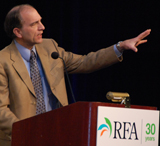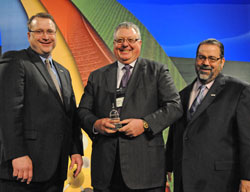 The most important issue facing the ethanol industry this year on a policy level is the future of biofuels tax policy when the Volumetric Ethanol Excise Tax Credit (VEETC) expires at the end of this year.
The most important issue facing the ethanol industry this year on a policy level is the future of biofuels tax policy when the Volumetric Ethanol Excise Tax Credit (VEETC) expires at the end of this year.
Several experts in tax policy and economics took the stage during the general session of the 2011 National Ethanol Conference Monday to tackle that issue They included U.S. Senate Finance Committee tax counsel Ryan Abraham, economic consultant David DeRamus with Bates White, Iowa State professor Bruce Babcock and Purdue University professor Wally Tyner. The panel was moderated by Renewable Fuels Association VP of Research Geoff Cooper.
 Babcock tackled the challenge of how the industry might better sell the VEETC to a budget-conscious Congress. He suggested looking at the way the federal sugar program has survived for decades by positioning itself as a “no-cost” program.
Babcock tackled the challenge of how the industry might better sell the VEETC to a budget-conscious Congress. He suggested looking at the way the federal sugar program has survived for decades by positioning itself as a “no-cost” program.
“The sugar program has been around forever, and the same groups that are lined up against ethanol have been lining up against the sugar program and they’ve been completely ineffective in getting rid of that program,” Babcock said. “So, the first alternative in terms of VEETC is to make it a no-cost program.”
Babcock explained how the sugar program operates by using import quotas to control supply and places assessments on excess sugar to pay for storage. “The analogy for the ethanol industry would be to use domestic consumption quotas, rather than import quotas to put a floor under demand,” he said. “The sugar alternative would simply be to rely on the RFS for conventional biofuels.”
Interesting concept and you can listen to or download Babcock’s comments here: Bruce Babcock at NEC



 America’s most well-known political odd couple were the keynote speakers for the National Ethanol Conference luncheon on Monday.
America’s most well-known political odd couple were the keynote speakers for the National Ethanol Conference luncheon on Monday. Chuck Woodside, General Manager of farmer-owned
Chuck Woodside, General Manager of farmer-owned  The
The  Dinneen addressed the pivotal changes facing the ethanol industry, starting with expiration of the Volumetric Ethanol Excise Tax Credit (VEETC) at the end of this year and the potential for complete reform of federal ethanol policy. “Congress does appear ready to end the ethanol tax incentive program, however. At least, end it in its current form and cost. Our industry needs to work with Congress and the Administration to reform the tax incentive moving forward.”
Dinneen addressed the pivotal changes facing the ethanol industry, starting with expiration of the Volumetric Ethanol Excise Tax Credit (VEETC) at the end of this year and the potential for complete reform of federal ethanol policy. “Congress does appear ready to end the ethanol tax incentive program, however. At least, end it in its current form and cost. Our industry needs to work with Congress and the Administration to reform the tax incentive moving forward.” The Chairman of the Renewable Fuels Association is Chuck Woodside, KAAPA Ethanol, LLC. He gave everyone a welcoming speech prior to the start of today’s golf tournament. I spoke with him during breakfast.
The Chairman of the Renewable Fuels Association is Chuck Woodside, KAAPA Ethanol, LLC. He gave everyone a welcoming speech prior to the start of today’s golf tournament. I spoke with him during breakfast. The
The 
